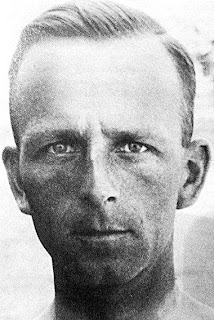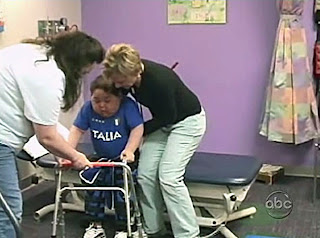 |
| St. Maximilian Maria Kolbe |
1894 –
January 7, 1894: Maximilian Maria Kolbe was born Raymond Kolbe in Zdunska-Wola, Poland to
a poor family. Both his parents were weavers – his father, Julius Kolbe, later joined the army and fought for Polish independence from Russia; his mother, Maria Dubrowska, later became a Benedictine nun. He was the 2nd child
in a family of 3 children – like him, his brother Alphonse would also become a priest.
 |
| Maria Dubrowska |
 |
| 7 Years Old |
1906 –
In
the town of Pabianice, Poland, the Blessed Virgin Mary appeared to the 12
year old Maximilian. In his words:
“That night I asked
the Mother of God what was to become of me.
Then she came to me
holding two crowns, one white, and the other red.
She asked if I was
willing to accept either of these crowns.
The white one meant
that I should persevere in purity and the red that I should become a martyr.
I said that I would
accept them both.”
1907 – Entered the preparatory
seminary of the Conventual Franciscans
in Lwow (Ukraine).
 |
| Parish Choir (1907) |
1910 – Became a novice at
the age of 16 and received his name in the Order, Maximilian.
1911 – September 5, 1911: made his first, “simple” vows.
1912 – November, 1912: began the study of
philosophy at the Pontifical Gregorian
University in Rome, Italy.
1914 –
November 1, 1914: Maximilian took his
final, "solemn" vows of poverty,
chastity and obedience. He also took the names Maximilian Maria to show his
devotion to the Blessed Virgin Mary.
On
the same year, his father was hanged by the Russians for treason.
1915 – October 22, 1915: obtained his Doctorate in Philosophy.
1917 –
October 16, 1917: the young
seminarian gathered 6 of his friends in a room at their seminary in Rome's Via San Teodoro to establish the
Militia Immaculatae (Immaculata
Movement) – a movement devoted to the conversion of sinners through the
intercession of the Blessed Virgin Mary.
On
the same year, he began showing signs of suffering from tuberculosis, a disease
which nearly killed him and caused him to be frail for the rest of his life.
1918 –
April 28, 1918: Maximilian was
ordained a priest in Rome at the age
of 24. The next day, he celebrated his first mass in the Basilica of Sant'Andrea delle Fratte at the “Altar of the Miracle”.
 |
| 1918 |
1919 –
July 22, 1919: Fr. Maximilian
obtained his Doctorate in Theology from
the Pontifical Theological Faculty of
St. Bonaventure in Rome, Italy.
A Marian devotee, he also composed the Immaculata
– a prayer of consecration to the immaculately conceived Blessed Virgin Mary;
his insights into the Immaculate
Conception will later influence the Marian
theology of the Second Vatican
Council.
1922 – Further spread the
Movement through publishing “The Knight
of the Immaculata” magazine.
1927 – Founded the Niepokalanow (City of the Immaculate
Mother of God) monastery in Teresin,
Poland; the community will soon grow to become one of the largest monasteries
in the world at that time.
1930 –
Fr.
Maximilian travelled to Asia to
further spread the Movement.
April 24, 1930: he and his
companions landed in Nagasaki, Japan.
Despite arriving penniless and not speaking a word of Japanese, he began
printing “Seibo no Kishi”, the
Japanese version of “The Knight of the
Immaculata” within a month.
 |
| 1930 |
1931 –
Fr.
Maximilian founded a monastery, Mugenzai
no Sono (Garden of the Immaculate), on the slopes of Mt. Hikosan in Nagasaki,
Japan. His choice of location to build the monastery was ridiculed by many –
some thought it was unwise to build on the mountainside facing away from the
town; others said it was bad “feng shui”
according to local Shinto beliefs. Fr.
Maximilian’s choice, however, would later prove to be providential (see 1945).
Later
on, he would also travel to India to
further spread the Movement.
1936 –
Fr.
Maximilian returned to Poland
because of poor health. Meanwhile, “Seibo
no Kishi” circulation grew to 65,000.
1939 –
September 1, 1939: Nazi Germany invaded Poland marking the start of World War 2.
September 19, 1939: Fr. Maximilian was
arrested for the first time and imprisoned.
 |
| Friars leaving Niepokalanow (1939) |
December 8, 1939: On the Feast of the Immaculate Conception, Fr.
Maximilian and the other friars were released from prison and returned to Niepokalanow
the next day where they began to organize a shelter for 3,000 Polish refugees – 2,000 of whom were Jews.
 |
| Document issued by the German authorities (1940) |
1941 –
February 17, 1941: Fr. Maximilian was
arrested again and imprisoned at Pawiak
in Warsaw, Poland where he was
subjected to cruel treatment by the Gestapo.
May 28, 1941: Fr. Maximilian was transported
via trainload of prisoners to Auschwitz
Concentration Camp where he was branded/tattooed “Prisoner No. 16670”. He was specially hated by his captors for 2 reasons:
being 1) Polish and 2) a Catholic Priest. Despite being ill, he was assigned
the hardest of tasks and many times was tortured until he passed out. During one
such incident, after being beaten and lashed by his captors, he was thrown in
the mud and left for dead. He was smuggled by his companions to the camp
hospital where he recovered. Upon returning to camp, Fr. Maximilian wasted no
time resuming his ministry to his fellow prisoners by hearing confessions and
celebrating mass.
July 28 – August 1,
1941:
During this period, a prisoner from Fr. Maximilian’s block (Block 14) vanished,
prompting the Deputy Camp Commander, SS-Hauptsturmführer Karl Fritzsch, to sentence 10 prisoners from the same barracks to
death in retaliation.
Karl
Fritzsch: “The fugitive has not been
found! You will all pay for this. 10 of you will be locked in the starvation
bunker without food or water until they die!”
One
of the selected men, Franciszek
Gajowniczek, imprisoned for helping the Polish Resistance, cried out: “My poor wife! My poor children! What will
happen to my family?”
Upon
hearing this, Fr. Maximilian took off his cap and silently stepped forward.
Karl
Fritzsch: “What does this Polish pig
want?”
Fr.
Maximilian: “I am only a Catholic priest
from Poland. Let me take his place. I am old. He has a wife and children.”
According
to a witness:
“From astonishment, the
commandant appeared unable to speak. After a moment, he gave a sign with his
hand. He spoke but one word: ‘Away!’ Gajowniczek received the command to return
to the row he had just left. In this manner, Fr. Maximilian took the place of
the condemned man.”
As
the 10 were led off to basement bunker of Block
13 to die, Fr. Maximilian supported a fellow prisoner who could hardly
walk.
 |
| Karl Fritzsch |
 |
| Franciszek Gajowniczek |
August 14, 1941: After weeks of
starvation, Fr. Maximilian and his fellow prisoners were barely alive. Some
were so thirsty that they resorted to drinking their own urine. Yet, not a
sound of anguish was heard to come from the bunker; instead there were those of
prayers and hymns by the prisoners led by Fr. Maximilian. Finally, the Nazi officials
decided that the cell had to cleared-out to make room for other prisoners. As
the executioner entered the bunker, Fr. Maximilian, the only one left who was
fully conscious, said a prayer and offered his left arm to be injected with a
lethal dose of carbolic acid. On the eve of the Feast of the Assumption of
the one whom he devotedly loved all his life, Maximilian died.
1945 –
August 9, 1945: the United States dropped an atomic bomb on
Nagasaki, Japan. Mugenzai no Sono
sustained minimal damage, with the other side of the mountain on which it was
built taking the worst of the blast. It remains one of the most prominent
monasteries in Japan until this day.
1969 – January 30, 1969: Pope Paul VI approved the heroic virtues of Fr. Maximilian and
declared him “Venerable”
1971 – October 17, 1971: Pope Paul VI beatified Fr. Maximilian as “Confessor” at St. Peter’s Basilica in Rome, Italy
1982 – October 10, 1982: Pope John
Paul II canonized Fr. Maximilian, his compatriot, a saint and “Martyr of Charity”.
 |
| Pope John Paul II and Franciszek Gajowniczek at the canonization of St. Maximilian Maria Kolbe (1982) |
Every August 14 (St. Maximilian Maria
Kolbe’s feast day), until
his death on March 13, 1995, Franciszek Gajowniczek went back to
Auschwitz to commemorate the life of the saint who died on his behalf.
 |
| Franciszek Gajowniczek (1995) |
“No one has greater love than this, to lay down
one's life for one's friends.”
(John 15:13)




















































